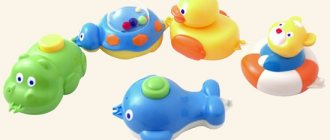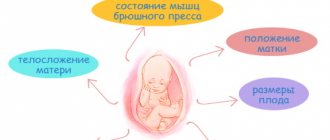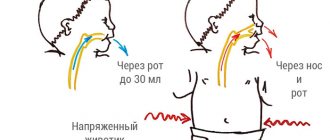What should a 2 month old baby be able to do?
2 months old baby: what should he be able to do and what should he look like? Let's look at the characteristics of the growth and development of a baby at this age, his ability to master new skills, feel the day and night routine, and perceive bathing before bed. Neonatologist Valeria Maksimovna Shchelkunova talks about the development of a very young child and his needs.
— Valeria Maksimovna, please tell us about the physiological features of a child’s development at two months.
— Usually by two months the child goes through a period of adaptation to the conditions of extrauterine life. His visual and auditory reflexes, expressive and impressive speech are formed, his intellect begins to develop, and his psychomotor development changes. By this age, the child can show emotions and communicate with his parents.
Physical development of a child at 2 months
| boys |
|
| girls |
|
— These data are presented in centile tables, which all pediatricians rely on when assessing the harmonious development of a child in accordance with his age. For example, if a baby is stunted, but his weight is within the normal range, this can sometimes be ignored, since this may be a genetic feature. Exceeding parameters, as a rule, is not as critical as falling behind.
— What is muscle tone at 2 months?
— Many parents worry about tone. But there is no need to sound the alarm and urgently run to neurologists and massage therapists if at this age the child’s tone is changed. It can last up to six months.
When a child’s muscle tone is normal
- At two to four months - in the hands, over time it will fade away.
- Up to six months - in the back.
- Up to eight months - in a dream, when the child does not control his movements.
During preventive examinations, the neurologist will pay attention to the activity of movements, tone in the child’s muscles and, if necessary, give recommendations. But if something is bothering you, an unscheduled visit to the doctor will not be a bad idea.
— Is it true that two months is the time when intestinal colic begins?
— Physiological colic actually appears more often during the period of two to three months, when the baby already needs to absorb a larger volume of milk than in the first month. What should parents do in this case? Calm down: with such colic, nothing bad happens to the baby. A tummy massage, a gas tube, heat on the tummy, and simethicone-based products can help reduce discomfort during colic.
— How does the development of premature babies at two months differ from the development of ordinary children?
— It all depends on the gestational age at which the child was born. Moreover, the shorter the gestational age, the higher the risk of concomitant pathology, because young children are very fragile.
For example,
- A 35-36 week old baby is considered premature, but it may not differ at all from a full-term baby; it will catch up and sometimes even surpass it in development.
- by the 30th week the child is already deeply premature, his development will lag behind that of his peers; the degree of delay usually corresponds to the week of gestation.
— The baby is 2 months old. Its development and how to deal with it is the main thing in our conversation. Tell us what a baby can do at 2 months of age.
— It is believed that at two months a child should lie on his stomach and hold his head up, but not all children can do this, which can be both normal and pathological. Therefore, with anything that worries parents, you should always contact a specialist. For example, muscle hypotonia may result in difficulty holding the head up, which requires the intervention of a neurologist.
What can a 2 month old baby do?
| Physical skills |
|
| Psychomotor development |
|
| Speech and social skills |
|
| Emotional Skills |
|
| Reaction to stimuli |
|
| Distinguishing objects |
|
— Is any deviation from the norm always interpreted as a developmental delay?
— Development outside the norm does not always equal deviation. Normal is an average, and most children fall within this diagnostic window, but not all. And if parents see that their child does not meet some generally accepted standards, they need to consult a doctor. But it is important to understand that the doctor does not make a diagnosis based on one parameter; he comprehensively assesses the child’s condition.
One warning sign does not always mean developmental delay. Therefore, it is better not to search for information on the Internet, not to make diagnoses yourself, but to seek medical help.
— What sleep and wakefulness regime is optimal for children of this age?
— An approximate two-month regimen might look like this:
- 7-8 feedings every 2.5-3 hours;
- 1.5-2 hours - period of wakefulness;
- 9-11 hours - night sleep with breaks for feeding;
- nap twice during the day from 1 to 3 hours and four to five times from 1 hour to 30 minutes.
The schedule depends on many things. The mother can roughly figure out how much the child ate, how much he slept, and how much time he has for a comfortable wakefulness. You need to listen to the child, monitor him, and then there will be no problems with establishing a routine.
- If your baby sleeps a lot at 2 months
- If a child sleeps more than normal, it means he needs it. You can wake the baby up for feeding, and at the same time he will sleep the rest of the time. But this option is extremely rare and, as a rule, after a cesarean section. More often you can come across complaints that the child does not sleep well. The reasons may be infant colic, incorrect routine, or going to bed too late.
- Restless sleep of a 2 month old baby
— Parents need to remember that if a child has slept less than needed, this does not mean that he will fall asleep faster because of fatigue. When a child is overtired, stress hormones are activated, which subsequently prevent him from falling asleep. The baby will be capricious, want to sleep, but will not be able to sleep. And even if sleep comes, under such circumstances it will be shallow, with waking up.
— What recommendations do pediatricians give for bathing?
— Washing the baby should be part of daily hygiene procedures. It is recommended to bathe thoroughly three to four times a week, and only once using a detergent, to prevent dry skin, maintain normal microflora and not reduce its protective properties.
In what water and how often should you bathe your baby?
- no longer than 10 minutes;
- water temperature - 37 degrees;
- for hardening purposes - at 26 degrees, but the temperature must be reduced gradually.
There is an opinion that with longer bathing, bathing before bedtime using herbal decoctions, the child will relax and sleep better. In fact, bathing does not have a calming effect on all children; for some it is quite invigorating. Also, you should not take a bath immediately before going to bed, because water procedures can overtire the child. Herbal infusions are not recommended because their effectiveness has not been proven and they often cause allergic reactions.
— How can parents develop a two-month-old baby?
— Some people don’t know what to do with a two-month-old baby: it seems that he only sleeps and eats. But a walk in the fresh air, simple gymnastics or water procedures are already the first developmental activities for a little person, because all the unknown and associated acquisition of new skills and new sensations is considered self-development.
How to develop a baby at 2 months
| General health, immunity |
|
| Physical development |
|
| Speech, hearing, emotions |
|
| Educational toys |
|
Whims, poor falling asleep, shallow sleep with frequent awakenings and the need to constantly pump, lull, pick up, and feed the child are often the result of a poorly structured schedule and overwork.
— Some parents record their children’s progress on video. Do such records help assess children's health?
— The recorded video will be useful at an appointment with the pediatrician. There are situations that are difficult to describe, but with video, the doctor can clearly see what is happening and assess the problem. In addition, the child at the appointment is in a stressful situation, and the baby may not demonstrate much of what the pediatrician would like to see. So, at this age there are often tremors and profuse regurgitation. Of course, it will help the pediatrician a lot if the parents show what happened and how.
The age of two or three months is special: the period of adaptation to extrauterine life has already ended, but the active period has not yet begun, and the child is in a somewhat “limbo” state. But this does not mean that you don’t need to work with him. It is important to help the baby develop, monitor the development of his skills and, if you suspect a pathology, consult a doctor. In terms of nutrition, this is also a special period. The child eats a lot and sleeps a lot. At the same time, closer to three months, the mother is just completing the formation of lactation, and bottle-fed children adapt to formula milk. A routine begins to be established, nutritional needs and habits emerge.
Neonatologist Valeria Maksimovna Schelkunova
*The ideal food for an infant is mother's milk. WHO recommends exclusive breastfeeding for the first 6 months. MAMAKO® supports this recommendation. Before introducing new foods into your baby’s diet, consult a specialist.
When to worry
If you notice that the baby’s weight is high, but at the same time the length of his body is behind the norm, you should contact a specialist. Such disproportionate parameters may indicate that development does not correspond to age. The doctor will help to correctly assess the condition and identify the problem in time if it exists.
Sometimes being overweight can indicate:
- hypothyroidism;
- problem with thyroid function.
Significant weight loss may indicate:
- stomach dysfunction;
- hormonal disorders;
- nervous system disorder.











